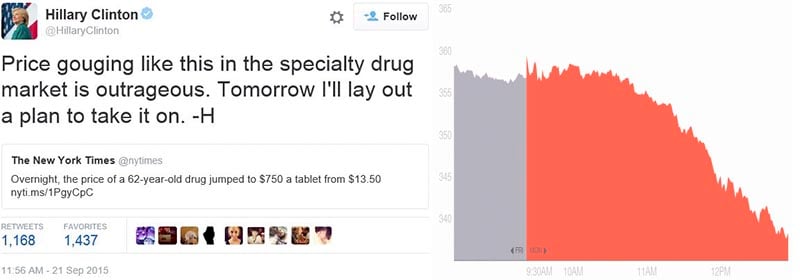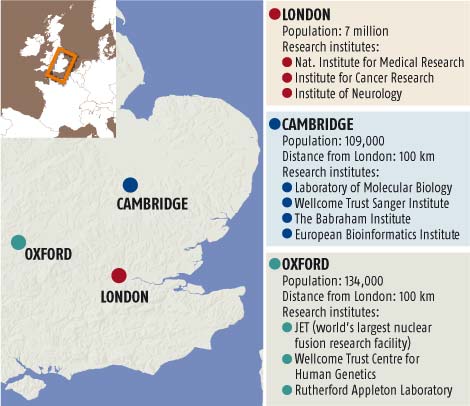I’m a UK Expat in Berlin, and whilst I admit confusion over where exactly the British Exit (i.e. “Brexit”) will leave me in the future, in general it is a depressing thought – for the UK Biotech Industry also. What exactly are the Industry logistics for the UK detaching itself from the EU?
 Admittedly there is a sense of ‘UK and Europe’ disjointedness, and it’s not just because of the English channel! When I moved here to work at Labiotech, it wasn’t really an issue until things got all political…
Admittedly there is a sense of ‘UK and Europe’ disjointedness, and it’s not just because of the English channel! When I moved here to work at Labiotech, it wasn’t really an issue until things got all political…
…and suddenly the idea we laughed at before is a real possibility, with votes for and against Brexit currently teetering around the 50-50 mark. But if we did this, we would be leaving an almost €15 trillion economy, predicted to grow by 1.9% this year (the best result since 2011) and 2% by 2017. The Economist gives a good overview for the individual countries within the Union.
Generally though, it’s confusing to UK voters as to what’s going on, and sadly it seems the Economics arguments for Brexit get lost in the emotions and sense of nationalism. There’s also a great article by Vice on the UK Expat mindset here in Berlin.
But what sort of repercussions could we (as Brits) really face? And when it comes to the legality of Business, what will this mean for the UK’s strong position within the European Biotech Industry?
From what we saw on the Labiotech Tour of the UK (see our documentary on the ecosystem there), the UK industry has flourished over the past 15 years.
There are several Medical research hotspots there, such as the Bloomsbury Centre for Global Health cluster in London. And two of the trendiest 7 European biotechs listed on the NASDAQ are also UK based (Adaptimmune and Immunocore).
Then there is a rich host of Biotech and Pharmaceutical venture capital specialists in the UK, such as Neil Woodford‘s firm (one of the top European Vcs). On the other hand, the Wellcome Trust is a well-known Global financier of start-ups through their Seeding Drug Discovery program.
Academic business subsidiaries are also key to the UK biotech scene. For example, just last July Imperial Innovations secured another €71M loan facility from the European Investment Bank (EIB) to support the company’s investments in the UK biotech and life science sector.

So why should the UK be concerned?
After a troublesome end to 2015 for many British biotechs (with no help from the US political scene…) the financial situation meant several company IPOs were postponed, caused by the sudden sense of unease on the markets.
This was quite a blow the industry as a whole, but it was still surprising to see how even the UK ‘Golden Triangle‘ was affected. And this certainly broke the illusion that with all its money and Academic excellence, the UK was not impervious to the tyranny of Twitter.

And with the National referendum voting as soon as this June on whether to leave or not, the rest of the Biopharma world felt it time to speak-out over the potential damage this could cause to the industry.
According to a collective of Pharma and Biotech leaders, not only would an exit from the EU negatively impact on the life sciences sector…but would pose significant risks to the UK’s ‘attractiveness‘ for inward investment, as a location for the world-leading talent (and immigration of researchers) the life sciences sector depends upon.

So what exactly do the Industry Leaders think?
Steve Bates, CEO of the UK’s biotech trade group the BioIndustry Association (BIA) told Fierce Biotech about how they were also routing for the UK to stay within the EU, due to the potential negative effects leaving could have on research in the Life Sciences.
Then John Lechleiter, the CEO of the US pharma giant Eli Lilly, told the Financial Times that they considered their UK Surrey based facilities as the ‘European centre‘ for their operations – and to undergo Brexit would really isolate the UK.
And since UK universities still rely on around 16% of research funding to come from the EU, Roger Perlmutter, head of R&D at MSD told the FT that Britain’s withdrawal from the EU would be ‘challenging’ for its scientists, who had ‘benefited from a world where they receive such grants’.
And we don’t want to be stuck in a similar situation Italy is experiencing with its Government at the moment, which is a real possibility with so many Conservative government cuts to the NHS and science bodies within the UK.

Then there is the EMA…
The most obvious challenge for the Biotech and Pharma industry, however, is the location of the European Medicines Agency (EMA), currently based in London.
Should the UK leave, the EMA would be obligated to also leave, taking with it the complementary (though unofficial) attraction.
And where would the EMA relocate to? We were speculating in the office that Paris could be a good contender, or perhaps Brussels. And the European Patent Office (EPO) is located in Munich, so it’s really hard to say where the EMA could land…

Generally though in practice it’s really very hard to find any tangible benefits for the UK leaving for the biotech industry. This is because even if the UK did leave, it would still want to access EU markets and avoid being charged a tariff (duty) on its sales into Europe. And, like other countries, the UK would end up having to confirm to EU rules anyway, just as an outsider with less ‘real’ influence…
For example; How would UK trials have to adapt to apply for market approval – would we have to found our own equivalent to the Swissmedic? Or would we adopt Norway’s strategy (as another non-EU member) and end up having to pay hefty fees to apply for EMA approval…?
Either way, the prospects of a Brexit for the UK biotech industry – particularly academic start-ups, is pretty glum. What do you think?
P.S. Stop being stupid, Britain.
Feature Image Credit: Remix of Materials by Labiotech (May be used under Creative Commons 3.0 License).





